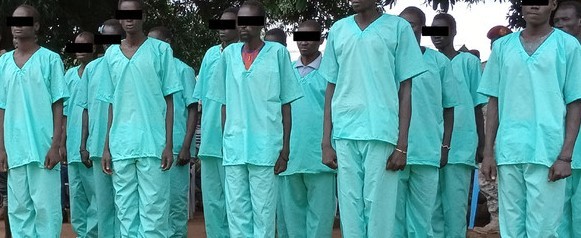Families of the victims of rape, looting, displacement, and murder orchestrated by government soldiers in Yei River County are demanding the unity government in Juba to pay war reparations.
Last month, a military court-martial in Yei convicted at least 26 South Sudan People’s Defense Forces (SSPDF) soldiers accused of committing various crimes including rape, killings, looting, and loss of ammunitions in Central Equatoria State.
According to the revitalized peace agreement, the Commission for Truth, Reconciliation and Healing (CTRH) shall inquire into all aspects of human rights violations and abuses, breaches of the rule of law and excessive abuses of power, committed against all persons in South Sudan by State, non-State actors, and or their agents and allies.
Under the peace deal, the CTRH is required to recommend processes for the full enjoyment by victims of the right to remedy, including by suggesting measures for reparations and compensation.
“My concern is that the victims must be protected and the families of the victims are compensated as it has been stipulated in the court proceedings so that justice is accorded to the victims and seen and even known by people in the community,” said John Luate, a family member of a rape victim in Yei River County.
Luate appealed to the court to ensure that the protection of victims and compensation is executed to promote true justice and can also lead to the reconciliation and healing in the country.
Taban Oliver, a legal aid officer at the South Sudan Law Society, called for clear observation of the rule of law in the country.
“I would say, the public interest has been met but on the other hand, the private interest has not been met because there is no compensation given to the victims. We expect that to be done so that victims feel justice has been done according to the penal laws of the country,” Oliver said. “Without implementing this, the state interest has not been met,” Oliver said.
Edmund Yakani, Executive Director of the Community Empowerment for Progress Organization (CEPO), said any military personnel in uniform must face the rule of law for any crime committed against the civilians.
“Accountability is needed in our country,” Yakani said. “Anybody, being police or military, whenever they commit atrocities against the civilians must not walk free and they must face the law for committing human rights crimes. Whether being rape, looting, killing, or intimidation against the civilians.”
Yakani said a lack of respect for the rule of law was promoting huge crimes committed by soldiers against the civil population in South Sudan.
“The current peace agreement cannot succeed if the rule of law is compromised,” said Yakani, a renowned activist. “We want to see this exercise done against the soldiers. There should be an application for the rule of law and discipline on any soldier who is abusing the national uniform for his gain.”
Yakani urged the transitional government of the revitalized government to uphold the rule of law in South Sudan.
Peter Bidal, another relative of a victim who was killed by a soldier, urges the military and the government to ensure that perpetrators of crimes are held accountable and serve their full sentence in the prison.
“We should not hear those perpetrators have been freed. We want to see that they are imprisoned and we don’t want the practice of releasing the victims within a short period,” Bidal said. “If this happens, there will be no peace and rule of law in South Sudan.”




